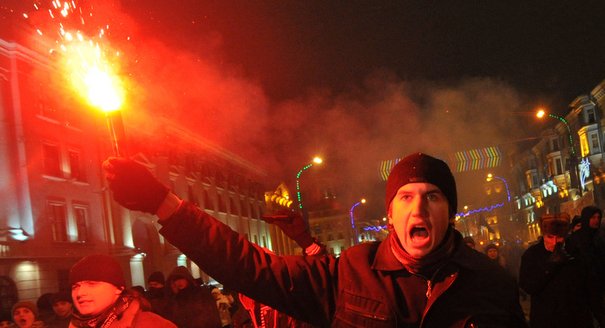On December 19, Belarusians went to the polls to cast their ballots in the country’s presidential election. An uncharacteristically liberal pre-election atmosphere gave rise to some hopes or even expectation of relatively free and fair elections among many local and international observers. The European Union and the United States held their breath for a positive report from the Organization for Security and Co-operation in Europe (OSCE) that would enable more engagement with Belarus.
The OSCE report on the elections could have been positive: Opposition candidates were allowed to run and were even given time to appear in televised debates. However, the voting process—which awarded President Aleksandr Lukashenka 80 percent of the vote—was marred by serious irregularities, plunging the streets of Minsk into scenes of violence. The authorities are maintaining that riot police only reacted to attacks on a main government building. However, independent media reports suggest that police also attacked peaceful demonstrations, assaulting and arresting opposition leaders and journalists.
It remains unclear whether the attacks were provoked by radical opposition leaders, whether they were a well-planned operation staged by the government, or whether police officers simply panicked and lashed out. Their toll, however, is undeniable: hundreds of people remain in prison and many others—victims of police actions—are recovering in hospitals around Minsk. The mood in the city is grim. The general public is disappointed with the result and some polls indicate that in certain precincts Lukashenka had trouble attaining even 50 percent of the vote. The opposition is now calling for fresh elections.
These terrible post-election events raise many questions: What will happen to the arrested demonstrators? Will an open and transparent investigation of the events take place? Will President Lukashenka avoid new arrests, an important point for the EU and United States which condemned the violence?
The key question at this point, however, is why, despite moderate improvements over previous elections, things went wrong in Belarus. Looking at these events it is useful to bear in mind that many of Lukashenka’s actions are driven by two simple factors: security and economics. The first relates to concern for his own security and that of his family. As for the second, he needs money to keep the economy afloat and to continue delivering the partly Soviet-style economic predictability that has made him popular.
While the EU can do little to guarantee the former, a free and fair election could have helped in mobilizing European support for the latter. So why—particularly after recent efforts at rapprochement with both Brussels and Washington—did Lukashenka allow events to occur as they did on Sunday? What went wrong with the plan to exchange a modest degree of political liberalization for Western money?
Two factors should be taken into account in understanding the situation: Tensions within Lukashenka’s entourage and a fragmented opposition. The former can be divided into hardliners who want to preserve the status quo and liberalizers who seek closer alignment with the West. The latter, in turn, is split between radicals who seek to draw attention by openly confronting the government and those who want to peacefully protest against electoral fraud.
Sadly, it seems the hardliners within the government and radical elements of the opposition gained the most from Sunday’s events. Government hardliners pushed successfully to crack down on the demonstrations and maintain their shaky hold on the status quo, while radicals within the opposition were able to thwart any rapprochement between Lukashenka and the EU, maintaining their monopoly over that privileged relationship.
Quite unsurprisingly, Commonwealth of Independent States (CIS) observers endorsed the election results and claimed them free and fair. Indeed, while no evidence of Russian involvement exists, it is clear Moscow will emerge as a big winner from the elections. It will remain the only source of security and financial stability for Belarus, allowing the Kremlin to more easily extract concessions in return.
The losers of Sunday’s events are President Lukashenka himself and the constructive elements of the opposition. The president risks losing the last bits of trust he has with the West and being ostracized by the EU and the United States, whereas the opposition runs the risk of not being taken seriously by the West if proof is found that its members attacked the government building. However, the biggest losers by far are the people of Belarus, who may end up completely isolated. Yet, there is still hope the people may emerge as winners in the days and weeks ahead if enough Belarusians demand—and receive—an open investigation of Sunday’s events and the resumption of liberalizing steps.
In its report on the elections, the OSCE cited “some specific improvements” in the conduct of the elections; however, it ultimately concluded that “Belarus still has a considerable way to go in meeting its OSCE commitments” for democratic elections. What matters now, though, is whether there will be new imprisonments or whether Belarus will continue its slow overtures toward the West by releasing the detainees and returning the missing human rights activists.
The latest statements by EU leaders condemning violence and expressing support for the public are a good first step in this direction. The EU should not lower its democracy and human rights standards. However, walking away too easily from engagement will harm the Belarusian people and will fail to facilitate closer ties between the EU and Belarus. The immediate next step by the EU should be to call for an open investigation into Sunday’s events with the participation of international experts. And if sanctions are to be re-introduced they should be applied to all those who broke the law.







